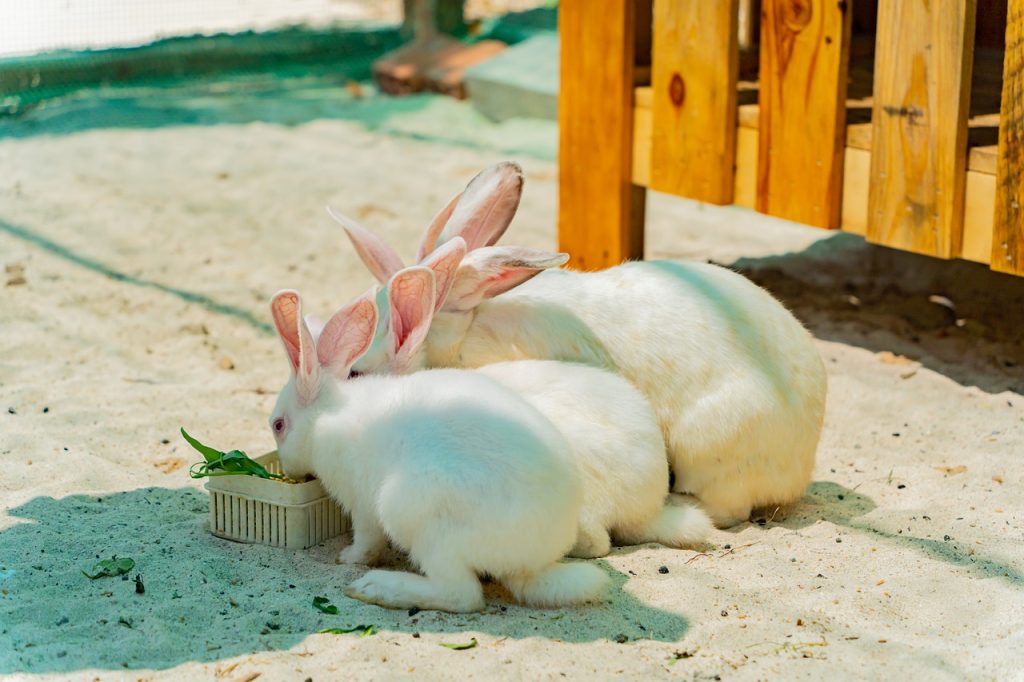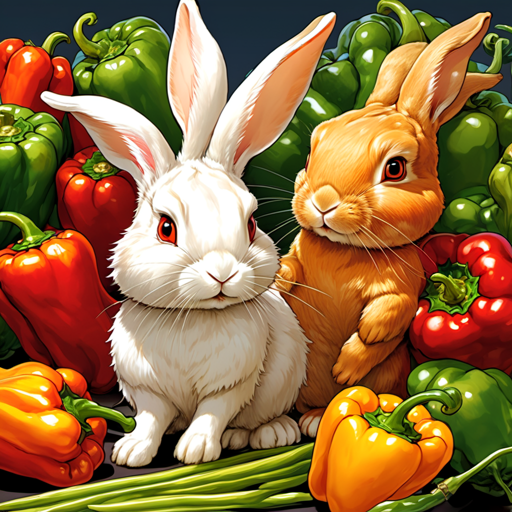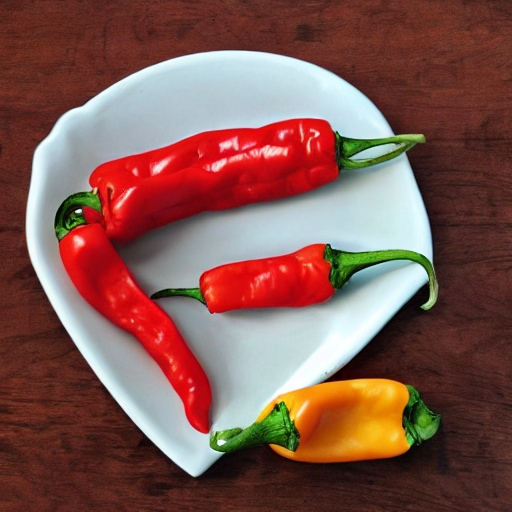Rabbits are delightful pets known for their varied diet. However, when it comes to peppers, there’s a bit more to consider than tossing them into a rabbit’s food bowl without a second thought. Let’s delve into rabbit dietary needs and explore whether peppers make a suitable addition to their meals.
So, let’s dive into the world of peppers and how they can be a delicious addition to your rabbit’s diet.
Can Rabbits Eat Peppers
Peppers are a healthy and rabbit-friendly vegetable. Most varieties, including yellow, green, red, or purple peppers, are safe for rabbits. However, it’s crucial to avoid feeding rabbits hot peppers like Jalapeno, Cayenne, or Habanero due to their sensitivity to spicy foods.
While occasional feeding of bell peppers is encouraged for rabbits, it’s important to start with a small portion to gauge the rabbit’s stomach reaction. Gradually increase the quantity if there are no signs of indigestion or diarrhoea.
Remember, an optimal rabbit diet typically comprises 80-85% fresh hay and grasses. Veggies and fruits, including bell peppers, should constitute at most 15% of their diet.

Understanding Rabbits’ Diet and Nutrition Needs
Understanding rabbits’ diet and nutrition needs is essential for their health and well-being. As herbivores, rabbits have specific dietary requirements that must be met to maintain a balanced diet. They require a high-fiber diet consisting mainly of hay, fresh vegetables, and limited pellets.
Hay is vital to a rabbit’s diet as it aids digestion and keeps their teeth healthy. It should make up most of their food intake, and various hay types, such as Timothy, Orchard grass, and Meadow grass, can be offered. Fresh vegetables should also be included in their diet, providing essential nutrients and hydration. Leafy greens like romaine lettuce, spinach, and kale are excellent options.
When it comes to peppers, rabbits can eat them in moderation. Peppers are a great source of vitamin C, which is essential for their overall health. However, it is important to note that some rabbits may have a sensitive digestive system, and feeding them too many peppers can cause stomach upset or diarrhea. It’s best to introduce peppers gradually into their diet and monitor their reaction.
In addition to hay and vegetables, rabbits can benefit from a small amount of high-quality pellets. These pellets should be specifically formulated for rabbits and should not exceed 5% of their daily food intake. Providing clean, fresh water at all times is also crucial.
Bell Peppers
Bell peppers, which come in various vibrant colours like red, green, yellow, and orange, are safe for rabbits to eat in moderation. These peppers are a good source of vitamins and can be a nutritious addition to a rabbit’s diet. However, it’s important to introduce them gradually and monitor how your rabbit reacts to ensure they don’t cause any digestive issues.
Always wash the peppers thoroughly and offer them in small, manageable pieces as an occasional treat alongside the rabbit’s main diet of hay and leafy greens.
Health Benefits of Bell Peppers for Rabbits
- Vitamin C: Rich in vitamin C, bell peppers support a rabbit’s immune system, aiding overall health and disease prevention.
- Fibre: The fibre content in bell peppers aids digestion, promoting healthy gut motility and helping prevent gastrointestinal issues like stasis.
- Hydration: With a high water content, bell peppers contribute to a rabbit’s hydration, which is essential for overall well-being and preventing urinary tract problems.
- Antioxidants: Bell peppers contain antioxidants such as carotenoids, which support cellular health and help combat free radicals.
- Teeth Health: The crunchy texture of bell peppers assists in wearing down a rabbit’s teeth, aiding in dental health by preventing overgrowth.
Hay can contribute positively to a rabbit’s health by including bell peppers as part of a varied diet and other safe vegetables and quality. Introduce new foods slowly and in moderation to monitor their response and prevent digestive issues.
Jalapeño Peppers
While jalapeño peppers contain capsaicin, which gives them their spicy heat, feeding jalapeños to rabbits is not advisable. Rabbits have a delicate digestive system, and spicy foods like jalapeños can cause digestive upset, discomfort, and even potential harm due to their sensitivity to capsaicin.
The spiciness can lead to gastrointestinal issues and irritation for rabbits. It’s safer to avoid feeding spicy foods like jalapeños to rabbits and offer them mild, rabbit-safe vegetables like bell peppers or other greens to ensure their well-being.
Sweet Peppers
Sweet peppers provide rabbits with beneficial nutrients like vitamin C, fibre, and antioxidants, contributing to their overall health when offered in moderation.
Health Benefits of Sweet Peppers for Rabbits
- Vitamin C: Bell peppers are rich in vitamin C, which is crucial for rabbits as they cannot produce it themselves. This vitamin supports their immune system, aids wound healing, and improves overall health.
- Fibre: Peppers contain dietary fibre, promoting healthy digestion in rabbits. Adequate fibre intake helps prevent gastrointestinal issues like stasis and supports gut motility.
- Hydration: With a high water content, sweet peppers contribute to a rabbit’s hydration, which is essential for overall health and preventing problems like urinary tract issues.
- Antioxidants: Bell peppers contain antioxidants like carotenoids, which help combat free radicals, supporting cellular health and overall well-being.
- Teeth Health: The crunchy texture of sweet peppers can assist in wearing down a rabbit’s continuously growing teeth, aiding in maintaining proper dental health.
Instructions to Prepare Bell Peppers for Rabbits

Preparing bell peppers for rabbits is simple! Here are the steps:
- Wash Thoroughly: Rinse the bell peppers under running water to remove any dirt, pesticides, or residues. This step is crucial to ensure the peppers are clean before offering them to your rabbits.
- Remove Seeds: Cut the bell peppers in half and scoop out the seeds and inner membranes. Seeds can be a choking hazard and might cause digestive issues, so it’s important to remove them entirely.
- Cut into Suitable Portions: Cut the bell peppers into smaller, bite-sized pieces appropriate for your rabbit’s size. Smaller pieces are easier for them to eat and can prevent wastage.
- Introduce Gradually: Start with a small amount when offering bell peppers to your rabbits for the first time. This helps gauge their reaction and prevents potential digestive upset if they’re not accustomed to this vegetable.
- Monitor for Any Reactions: After introducing bell peppers, watch your rabbits for any signs of allergic reactions or digestive issues. If they show any adverse reactions, discontinue feeding bell peppers and consult a veterinarian.
By following these steps, you can safely prepare bell peppers for your rabbits, ensuring they enjoy this nutritious treat without any risks to their health.
Peppers Can Help a Rabbit’s Digestive System
Peppers can indeed offer some benefits to a rabbit’s digestive system. However, it’s essential to introduce them gradually and in moderation. Bell peppers, for instance, can be a tasty addition to a rabbit’s diet due to their high vitamin C content, which supports overall health, including the immune system.
Additionally, the fibre in peppers can aid digestion, helping prevent issues like gastrointestinal stasis in rabbits. Always ensure that peppers are thoroughly washed, remove seeds, and offer them in small amounts to avoid upsetting your rabbit’s stomach.
It Improves Their Skin Health
Peppers contain vitamin C and other antioxidants that can contribute to a rabbit’s overall health, including their skin. Vitamin C is essential for collagen production, which helps maintain healthy skin and fur. Including peppers in a rabbit’s diet and a balanced intake of other fresh vegetables can support their skin health and contribute to a shiny, healthy coat.
However, it’s important not to overfeed peppers or other food items, as excessive amounts can upset a rabbit’s digestive system. Moderation is key when introducing new foods to their diet.

Can Rabbits Eat Bell Peppers?
Yes, rabbits can eat bell peppers. Bell peppers are safe for rabbits and can be a healthy addition to their diet when offered in moderation. They are rich in vitamin C, which is beneficial for rabbits, and the crunchy texture can also help wear down their teeth.
However, always introduce new foods slowly and in small quantities to ensure they don’t cause any digestive upset. Remove the seeds and wash the pepper thoroughly before offering it to your rabbit. Aim for variety in their diet and include a mix of vegetables to ensure they get a well-rounded nutritional intake.
Should You Feed Your Rabbits Pepper Seeds?
It’s generally advisable to avoid feeding pepper seeds to rabbits due to several reasons:
- Choking Hazard: Pepper seeds are small and can pose a choking risk, especially for smaller rabbits or those prone to eating quickly without chewing thoroughly.
- Digestive Issues: Seeds, in general, might be difficult for rabbits to digest. While some seeds might pass through their digestive system without causing harm, others can cause blockages or discomfort.
- Nutritional Concerns: Pepper seeds might not offer significant nutritional value to rabbits, and the potential risks outweigh the benefits.
To ensure your rabbit’s safety and digestive health, removing seeds from peppers before feeding them to your pets is best. Stick to offering the fleshy part of the pepper in small quantities, gradually introducing it into their diet to observe how they tolerate it. Monitor your rabbits after introducing new food to watch for any adverse reactions or digestive issues.
What Health Benefits Do Bell Peppers Offer for Rabbits?
Bell peppers can offer several health benefits for rabbits when included as part of a balanced diet:
- Vitamin C: Bell peppers are rich in vitamin C, which is crucial for a rabbit’s health. Rabbits, like humans, cannot synthesize vitamin C independently and require it in their diet. Vitamin C helps support the immune system, aids wound healing, and promotes overall health.
- Fibre: Peppers, including bell peppers, contain dietary fibre. Fibre is essential for maintaining proper digestion in rabbits, helping prevent issues like gastrointestinal stasis. It promotes gut motility and supports a healthy digestive system.
- Hydration: Bell peppers have a high water content, contributing to a rabbit’s hydration. Adequate hydration is vital for overall health and helps prevent urinary tract problems.
- Antioxidants: Bell peppers contain antioxidants like carotenoids, contributing to overall health by combating free radicals and supporting cellular health.
- Teeth Health: The crunchy texture of bell peppers can help wear down a rabbit’s continuously growing teeth, contributing to good dental health. Chewing on fibrous vegetables like peppers helps maintain proper tooth length and wear.
While bell peppers offer these benefits, they should be part of a varied diet that includes other fresh vegetables and high-quality hay.
Introduce new foods gradually and in small amounts to avoid upsetting your rabbit’s digestive system. Always remove seeds and thoroughly wash the peppers before feeding them to your rabbits. Moderation is key to ensuring a balanced and healthy diet for your furry friends.

Frequently Asked Questions
Can Rabbits Eat Sweet Peppers?
Yes, rabbits can eat both green and red peppers. Both varieties belong to the bell pepper family and are safe for rabbits to consume. These peppers contain beneficial nutrients like vitamin C, fibre, and antioxidants that can support a rabbit’s health when offered in moderation.
Ensure the peppers are thoroughly washed, seeds are removed, and they are provided in small amounts initially to prevent any digestive issues. Variety in their diet is important, so offering both green and red peppers can add diversity to their nutritional intake.
Can rabbits eat spicy peppers?
Some spicy peppers like jalapeños and habaneros might not suit all rabbits due to their heat levels. It’s advisable to start with milder options and observe your rabbit’s reaction.
How much pepper should I give my rabbit?
Start with small quantities, gradually increasing based on your rabbit’s tolerance. Consulting a veterinarian for specific guidelines is recommended.
Are all parts of the pepper safe for rabbits?
Seeds and stems can sometimes be challenging for rabbits to digest. It’s advisable to remove these before feeding peppers to your pet.
Can Rabbits Eat Yellow Peppers?
Yes, rabbits can eat yellow peppers! They are a safe and healthy treat for rabbits when given in moderation. Just introduce new foods slowly and in small quantities to ensure your rabbit tolerates them well.
What if my rabbit shows signs of discomfort after eating peppers?
If you notice any adverse reactions or digestive issues, discontinue feeding peppers and consult a vet immediately.
Can peppers replace other elements in a rabbit’s diet?
Peppers should be considered a supplement to a rabbit’s diet, not a replacement for other essential foods like hay and leafy greens.
Can Rabbits Eat Red Peppers?
Yes, rabbits can eat red peppers. Red peppers and other bell peppers are safe for rabbits to consume in moderation. They are a good source of vitamins, particularly vitamin C, and can add variety to a rabbit’s diet.
Can Rabbits Eat Sweet Peppers?
Yes, rabbits can eat sweet peppers in moderation. Sweet peppers are a good source of vitamins and minerals, including vitamin C. However, it’s essential to introduce new foods gradually and in small amounts to observe how your rabbit reacts.
Conclusion
In conclusion, when it comes to feeding rabbit peppers, it’s best to stick to safe options like bell peppers while avoiding spicy varieties such as jalapeños. Bell peppers can offer valuable nutrients like vitamin C, fibre, and antioxidants, contributing to a rabbit’s health when given in moderation.
Always wash the peppers thoroughly, remove the seeds, and introduce them gradually to prevent digestive issues. Prioritizing their well-being by offering a balanced and rabbit-friendly diet ensures their health and happiness.

